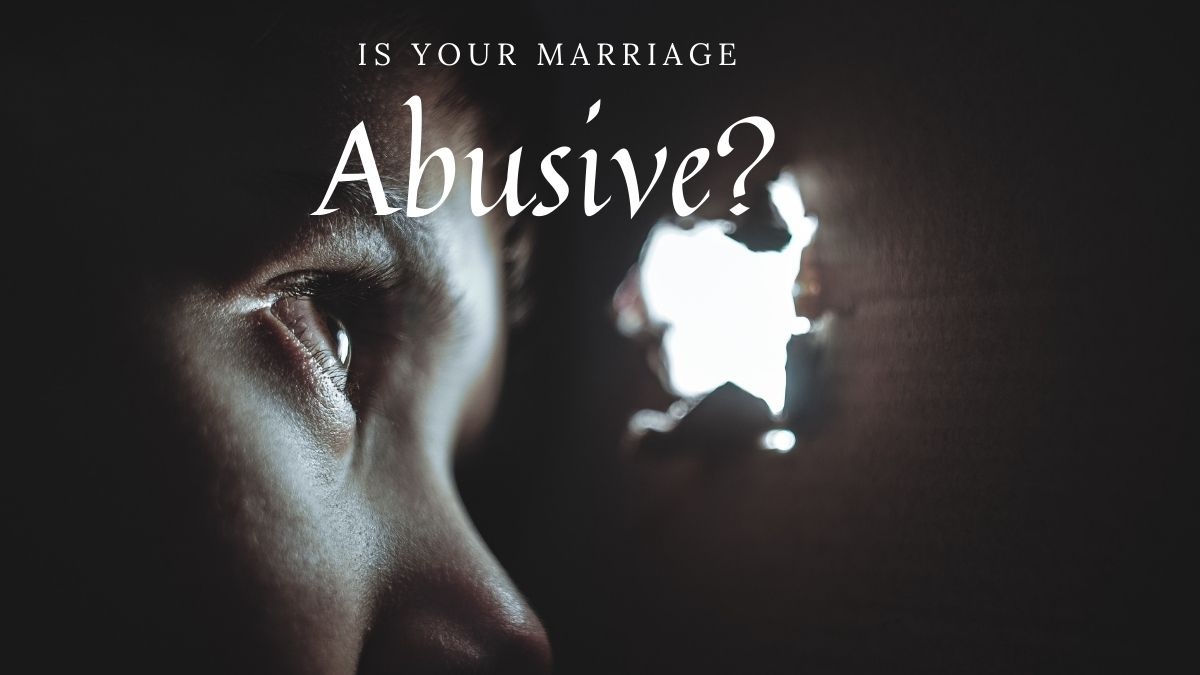Is Your Marriage Abusive?
Abigail and Nabal.
Are you familiar with this Biblical couple? If not, I encourage you to read 1 Samuel 25 now.
The story of Abigail and Nabal is your classic story of an angry, toxic man married to a kind, empathic woman. According to verse 3, Abigail was sensible and beautiful, but Nabal was crude and mean.
David encountered the couple and showed kindness toward them. He reached out and requested some provisions for his troops as they fled from King Saul. Nabal selfishly refused.
Nabal’s servants realized that David and his troops were angered by Nabal’s response, and they rushed to Abigail, begging her to intervene. Abigail wisely—and secretly—gathered a feast fit for a king and went to meet David.
When Abigail saw David, she quickly got off her donkey and bowed low before him. She fell at his feet and said, “I accept all blame in this matter, my lord. Please listen to what I have to say. I know Nabal is a wicked and ill-tempered man; please don’t pay any attention to him. He is a fool, just as his name suggests. But I never even saw the young men you sent. 1 Samuel 25:23-25
Abigail not only served David, but she offered to take the blame for her husband’s foolishness!
I don’t know how many times I’ve read the story of this couple. Abigail and Nabal represent the classic narcissistic, abusive husband and a godly, empathic wife. It’s a story that plays out over and over in society today, in churches around the world.
I am a firm believer in the sanctity of marriage. However, I also believe God doesn’t expect us to remain in abusive marriages. You see, Malachi 2 is not really about how much God hates divorce; instead, it’s about how abusive spouses weary the Lord. Throughout scripture, God is about setting captives free, lifting the downtrodden and abused. He allowed divorce as a kindness to women who were being mistreated by their husbands (Deuteronomy 24). How can we look at the whole of scripture, the heart of God, and condemn someone to live in an abusive marriage? I can’t reconcile the God I know with that theology.
However, we have to be careful. There is a difference between a difficult marriage and an abusive marriage. I believe God wants us to persevere, to endure difficult circumstances. We learn so much about the Father and about living for an eternal perspective when we face trials of many kinds (James 1:2). But a difficult marriage is quite different from an abusive marriage.
How do you know if you are in a difficult marriage or a toxic and abusive marriage?
Consider his reputation. Nabal had a reputation for being foolish. (vs. 25), ill-tempered (vs 24), crude and mean (vs 3). An abusive spouse is not someone who is occasionally difficult; if it was, we would all be in trouble. No, an abusive spouse has a character problem. He/she is known for being easily angered, for controlling and manipulating. He/she is mean as a general rule, not as an exception. His/her spouse is constantly walking on eggshells to keep from upsetting him/her. His/her spouse often finds it easy to give in and go along with him/her rather than stand up for what is right.
An abusive marriage is characterized by adultery, manipulation, anger, control, addiction, blamind, and so much more. Often the abusive spouse has so destroyed the confidence of his/her partner that the abused spouse believes he/she truly is the problem.
For a great discussion on the differences between toxic and abusive marriages, please pick up a copy of Gary Thomas’s book When to Walk Away.
Consider the Biblical context. Some people will argue that Abigail stayed because she believed in the sanctity of marriage, that she endured a difficult marriage because that’s what God would have her do. Before you jump to the conclusion that Abigail was setting a precedent for an abused spouse, please consider the biblical context.
Women had no rights in Bible times. Wives were purchased and typically considered a piece of property. A woman could not divorce her husband; only a husband could divorce his wife. A woman that was divorced was unable to work and support herself, so she was left to beg to provide for herself and her family. Abigail had no choice but to remain in her marriage.
We do not live in a culture that prevents women from working or walking away. While I can attest that the life of a single mom is difficult, it is not impossible. As women today, we can obtain and education and provide for our children. We have the right to walk away, unlike Abigail.
Just because Abigail stayed does not mean she was setting a precedent for us.
Consider the bigger picture. Abigail saw the bigger picture of the circumstances. She knew that David and his men were going to attack because of Nabal’s attitude. Abigail knew that she needed to act to protect herself and those within her household.
And because she saw the bigger picture, she went against her husband’s wishes.
Yes, scripture teaches that women are to submit to their husbands (Ephesians 5:22). Scripture teaches that we are to submit to one another out of a reverence for Christ (Ephesians 5:21). But when it comes to doing good, to being obedient to Christ or our spouse, we should always choose to do good and follow God—even when it goes against what our spouse wants.
Consider God’s perspective. God is omniscient. He sees all things, knows all things. He knows what the future holds. He knows how things are going to turn out.
Abigail’s oppression did not go unnoticed by God. He saw her heart and had compassion for her. Nabal’s life was cut short, and David—so impressed by Abigail’s kindness and courage—took her as his own wife. While Abigail endured much, God was working all things for her good (Romans 8:28).
We don’t see things the way God does. We have to remember that in His sovereignty, He is working things out.
So what is an Abigail to do when she is married to a Nabal?
Seek God’s direction. God has the ability to change even the most hardened heart—but not every soul surrenders to the work of God in his/her life. Only God knows whether your spouse will surrender and allow the Holy Spirit to change him/her. And that is why we must be in step with the Spirit.
From my vantage point, my ex-husband never surrendered to the Father. His heart was hardened toward me (and, in my opinion, God) until the day of his death. I believe God knew he wouldn’t surrender and therefore gave me permission to walk away.
When you have been raised knowing marriage is a sacred covenant, it is incredibly difficult to hear God say it’s ok to walk away. Because our hearts long to keep our commitment, we must be so close to Him that we can hear His still, small voice as He whispers, “It’s ok to walk away.”
Walk in obedience. When you have heard God’s direction, you must take steps of obedience. If He tells you to walk away, obey. If He tells you to stay, stay and pray. God always rewards our obedience.
Trust God for the outcome. Whatever God tells you to do, put your trust in Him. Prepare yourself to see Him do a mighty work in you so He can do a mighty work through you. Believe He has a great plan for you, a plan to give you a life you never dreamed you could live.
In the story of Nabal and Abigail, God chose to take Nabal’s life from him. David stepped in and married Abigail, the woman who had courageously shown him such kindness. In my own life, God gave me an incredible life and redeemed everything I lost. He has given me a ministry that spans the globe, helping others overcome the pain of adultery, abuse, and divorce. And the intimacy I gained in my relationship with God? There is nothing that compares.
Are you married to a Nabal? If so, don’t lose heart. There is a beautiful future ahead!






I cannot adequately describe the blessing of your post of your marriage because sounds so much like mine my own story. I been divorce for over 10 years and as you stated so well there’s nothing I experienced can compare to the devastation of divorce. Mentally it was destroying me.
I’m so sorry for your pain, Angelia. God is faithful. He restores what has been lost. I pray you’ve found that to be true!
As always, your words are timely and encouraging. It’s very difficult to determine the extent and validity of an emotionally abusive relationship when others do not see it and it is not an “all the time” thing. You hope and believe in the calm, quiet times, but are on alert for a red flag…even though you know you’re the only one who sees the flag waving. Navigating relationships like this is tough, and the enemy plants many unpleasant, ungodly thoughts in your mind which makes it harder to deal with. Believing for God to direct, protect, and provide; as He promises He’ll always do.
How true your words are! I never saw it as abuse until I was far removed. I suffered many years waiting for God to change it into the marriage He wanted for me. I certainly never dreamed God’s answer would be the path I’ve traveled.
My whole marriage has been one of emotional abuse, neglect, no affection, manipulation that I do not know what a normal marriage should be like. I will be hitting 60 in a few short years and I do not see any kinsman redeemer or a different life to what I am enduring now. Maybe it happens to some only
I’m so sorry for your pain. Are you currently married? Are you still in relationship? Can I just say there’s always a resurrection with Jesus! He came to give new life! Redemption doesn’t always look the way we expected, but it is SO incredibly beautiful! Keep your eyes on Him and let Him guide you into the beautiful future He has for you!
Thank you for this.
I really struggle with the whole issue of divorce and remarriage and if God allows remarriage. Can you please speak on this.
In my interpretation, God allows remarriage. See Deuteronomy 2 and 1 Corinthians 7:27-28 (esp CEB version). For a great resource, read David Instone-Brewer’s book On Divorce and Remarriage in the Church. I’d also be happy to talk more in-depth with you. Just send me an email. It’s hard to put it all in an email!